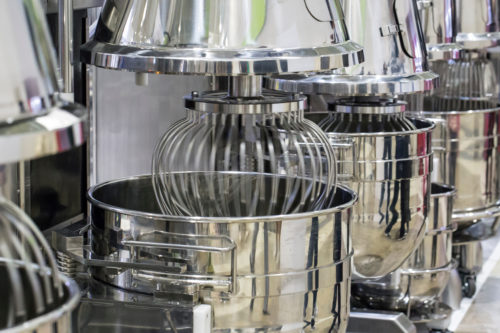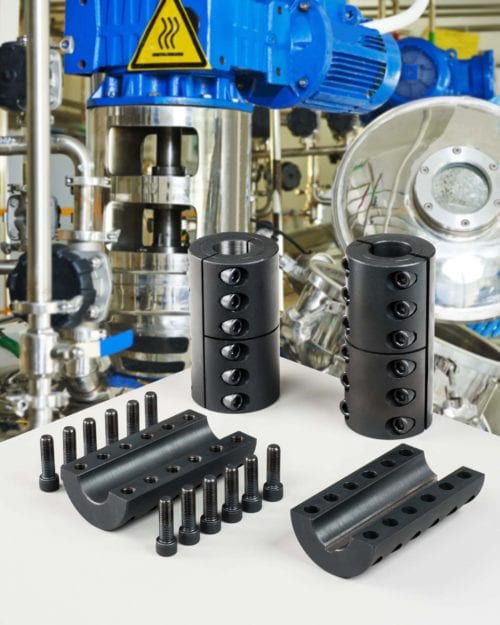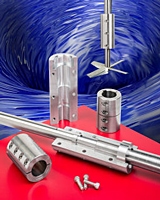What Is the Best Coupling for a Mixer?
 Mixers are common industrial devices that consist of a motor and a propeller or paddle with a coupling acting as the connection point. Mixers are flexible, adaptable pieces of equipment found in a range of industries, from food processing to mining to chemical facilities.
Mixers are common industrial devices that consist of a motor and a propeller or paddle with a coupling acting as the connection point. Mixers are flexible, adaptable pieces of equipment found in a range of industries, from food processing to mining to chemical facilities.
Choosing the correct coupling for a mixer can be challenging as it needs to have an exact, rigid fit . This blog will highlight how to determine the right coupling for your mixer and how our configurator tool can help you configure your rigid coupling to your needs.
What Is a Rigid Coupling?
Unlike flexible couplings, a rigid coupling does not allow any radial or axial motion between the driving shaft and the driven unit. It is primarily used for vertical applications. Rigid coupling types include:
- One-piece split couplings when there is access to both the motor shaft end and the paddle attachment.
- Two-piece split couplings for easy assembly when in-line installation is needed.
- Three-piece split couplings when the end of the shaft will remain fixed while the other is moved or changed (very common for mixer situations when paddles would be changed or replaced).
- Flanged couplings when mounting options are needed.
On mixers, the motor is bearing-supported, but the shaft on the impeller side is not. Using a flexible coupling would require close bearing support on the paddle, but the sleeve-like design of rigid couplings eliminates the need for a bearing to support the paddle. This makes rigid couplings the only viable option for mixers.
Rigid couplings have a simple and durable design, allowing greater transmission of power to mixers. They are more cost-effective than other options and offer more design flexibility. While requiring exact alignment between shafts, rigid couplings offer a stronger connection, higher torque, and more precision than flexible couplings.
 Advantages of Rigid Couplings for Mixers
Advantages of Rigid Couplings for Mixers
Rigid couplings provide advantages, such as:
- Excellent Torque Transmission: They can transfer torque efficiently between connected shafts.
- Low Production Costs: Manufacturers such as Stafford Manufacturing can produce custom and standard rigid couplings at affordable prices.
- Torsional Stiffness: Its high torsional stiffness enables better positioning.
- High Precision: Rigid couplings offer high precision with almost no windup or backlash.
- Alignment Capabilities: They can establish shaft alignment between the connected parts and the motor.
- Easy Assembly: Rigid couplings have a simple design, allowing for easy assembly, disassembly, and maintenance operations throughout the coupling’s lifespan.
Considerations for Selecting a Rigid Coupling for a Mixer
Choosing the best coupling for a mixer requires precision. Stafford Manufacturing’s configurator tool can help you customize a rigid coupling that suits your exact needs. Configure it by bore diameter, coupling style, coupling material, screw material, finish, and other options available upon request.
Here are more details about the top considerations for choosing a rigid coupling for a mixer.
Bore Diameter
Bore diameter ranges from ¼” to 4”. Choosing the right diameter is key to ensuring a precise alignment.
Coupling Style
Coupling styles include one-piece, two-piece, and three-piece. One-piece styles have high torque capacities, unlike set screw type couplings. Two-piece styles allow for easy assembly and adjustment. Three-piece styles are used to maintain one shaft’s positioning while the other is adjusted.
Material Selection
Material selection is based on the substance your coupling is exposed to. Coupling materials include brass, 303 and 304 stainless steel, weldable steel, carbon steel, and 2024 aluminum.
How to Choose the Best Coupling for a Mixer
Consider these factors when deciding on the best coupling for your mixer:
- Shaft size
- Keyway size if needed
- Required torque capacity
- Bore diameter
- Material requirements for specialized (i.e. food-grade) applications
Stafford’s rigid couplings meet these criteria as they are designed with end users’ needs in mind. Our rigid couplings come in different types, from the common one-piece split clamp coupling to precision sleeve couplings.
Choose Stafford as Your Coupling Manufacturer
Stafford is the leading manufacturer of high-quality shaft couplings and rigid couplings. With the help of our configurator tool, you can determine the right rigid coupling for your needs. Contact us to learn more or request a quote for our products.



